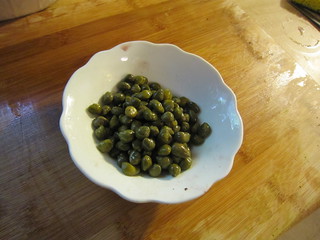.png)
VeggieDag Thursday is an occasional Thursday post
on an animal-free diet and ecological issues.
Beer and wine are, after all, fine vegetarian foodstuffs.
*************
Quick Links for May 2014
- 2014.05.23.
California's severe drought isn't making food cost more despite 75 percent less water from dams and reservoirs. Why?- Many farmers are pulling from the aquifer.
- Some parts of California are less dry than others, such as the Salinas Valley.
- The limited water is going to crops that consumers are most likely to notice.
— Via NPR: The Salt.
- 2014.05.17.
What Farm-to-Table Got Wrong.
— Via Dan Barber (in the New York Times) —author of the forthcoming book “The Third Plate: Field Notes on the Future of Food.”
"For all its successes, farm-to-table has not, in any fundamental way, reworked the economic and political forces that dictate how our food is grown and raised. Big Food is getting bigger, not smaller. In the last five years, we’ve lost nearly 100,000 farms (mostly midsize ones). Today, 1.1 percent of farms in the United States account for nearly 45 percent of farm revenues. Despite being farm-to-table’s favorite targets, corn and soy account for more than 50 percent of our harvested acres for the first time ever. <...> Diversifying our diet to include more local grains and legumes is a delicious first step to improving our food system. <...>Imagining the food chain as a field on one end and a plate of food at the other is not only reductive, it also puts us in the position of end users. It’s a passive system — a grocery-aisle mentality — when really, as cooks and eaters, we need to engage in the nuts and bolts of true agricultural sustainability."
- 2014.05.14.
Non-Celiac gluten sensitivity may NOT exist, says the researcher of the original study which said it did exist. In 2011, Peter Gibson, a professor of gastroenterology at Monash University and director of the GI Unit at The Alfred Hospital in Melbourne, Australia, published a study that found gluten, a protein found in grains like wheat, rye, and barley, to cause gastrointestinal distress in patients without celiac disease, an autoimmune disorder unequivocally triggered by gluten.
However, in a followup study, Gibson has come to the opposite conclusion: “In contrast to our first study… we could find absolutely no specific response to gluten." Patients reported gastrointestinal distress without any apparent physical cause. Gluten wasn't the culprit; the cause was likely psychological.
— More, via Real Clear Science.
- 2014.05.12.
The National Wildlife Foundation certifies areas as official Wildlife Habitats. The beer garden at Boundary Bay Brewery & Bistro in Bellingham, Washington, is the only brewpub it has designated as such.
— Via YFGF.
- 2014.05.12.
A NASA-funded study by the University of California at Irvine has found that the West Antarctica ice sheet is collapsing irreversibly. Seas, world-wide, will rise up to rise 12 feet, but not suddenly, in spite of what the word “collapse” implies, said a statement by the university in announcing its report. “The fastest scenario is 200 years, and the longest is more than 1,000 years.” University scientists used detailed maps and computer models to reach their conclusion “that a collapse appears to have already begun.”
— More, via Washington Post.
- 2014.05.07.
The increasing demand for nutrient-dense micro-greens, such as kale, mizuna, tatsoi, and shungiku.
— Via Kojo Nnamdi Show.
- 2014.05.06.
U.S. climate report —National Climate Assessment— says that global warming impact is already severe, and only to worsen. "The report cites wide and severe impacts: more sea-level rise, flooding, storm surges, precipitation and heat waves in the Northeast; frequent water shortages and hurricanes in the Southeast and the Caribbean; and more drought and wildfires in the Southwest."
— More via Washington Post.
- 2014.05.06.
The biochemistry of chili peppers, which are actually fruits, and are believed to be the first plants ever cultivated by humans, in what is now Bolivia and Peru, over 6,000 years ago.
— Via Chemistry Views.
- 2014.04.24.
The city of Washington, D.C. has decided to to regulate Farmers’ Markets on health issues and prepared foods.
— Via Washington City Paper.
- 2014.04.24.
The history of "salt-rising bread" bread dates to the isolated Appalachian region in the late 1700s, where enterprising women who did not have access to yeast figured out a way to make a yeast-free bread. The origins of the name are also unclear. There's little or no salt in the recipe. No yeast, either. The bread rises because of bacteria in the potatoes or cornmeal and the flour that goes into the starter. The taste is as distinctive as the recipe. Salt rising bread is dense and white, with a fine crumb and cheese-like flavor.
— More, via NPR: The Salt.
- 2014.04.17.
What are called "capers" are actually the unflowered buds of the caper plant.
— Via The Splendid Table.
- 2014.03.31.
"Gone are the days of experts calling for ultra-low-fat diets. For instance, it's clearer that some fats, namely plant-based fats found in nuts and olive oil, as well as those found in fatty fish, are beneficial. There's strong evidence that they help reduce the risk of heart disease."
— More, via NPR: The Salt.
- 2014.03.31.
The Intergovernmental Panel on Climate Change (IPCC) of the United Nations has released a report warning that the impact of global warming will be "severe, pervasive, irreversible."
The report details significant short-term impacts on natural systems in the next 20 to 30 years. These include threats to unique systems such as Arctic sea ice and coral reefs, where the risks are said to increase to "very high" with a 2C rise in temperatures. Food security is highlighted as an area of significant concern. Crop yields for maize, rice and wheat are all hit in the period up to 2050, with around a tenth of the projections showing losses of over 25%n of yields.
— More, via BBC.
- 2014.01.12.
Huanglongbing —also known as “yellow dragon disease” and “citrus greening” is a currently incurable bacterial infection that may destroy all of Florida's citrus crop, where about half the trees in every citrus orchard are stricken. The bacteria is spread by a tiny, invasive bug, also from China, called Asian citrus psyllid. Roots become deformed. Fruits drop from limbs prematurely and rot. The trees slowly die. Citrus greening has caused a severe lime shortage in Mexico; there is worry that the disease will soon spread to California's citrus crop.
— Via Washington Post and LA Times.
-----more-----
- Why the name VeggieDag Thursday? Here.
- Read all the posts: here. Follow on Twitter with hashtag: #VeggieDag.
- Suggestions and submissions from chefs, writers, and home-cooks welcomed! Contact me here.













No comments:
Post a Comment
Comment here ...